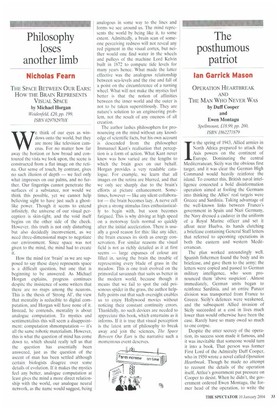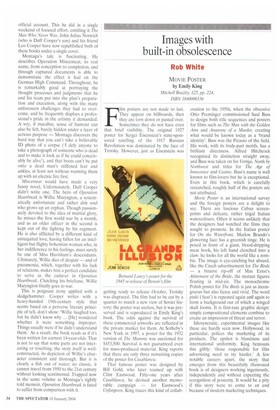The posthumous patriot
Ian Garrick Mason
OPERATION HEARTBREAK AND THE MAN WHO NEVER WAS by Duff Cooper and Ewen Montagu Speilmount, £18.99, pp. 200, ISBN 1862271879 1 n the spring of 1943, Allied armies in North Africa prepared to attack the Axis powers on the continent of Europe. Dominating the central Mediterranean, Sicily was the obvious first target, and it was clear the German High Command would heavily reinforce the island. To counter this, British naval intelligence concocted a bold disinformation operation aimed at fooling the Germans into thinking the Allies' real targets were Greece and Sardinia. Taking advantage of the well-known links between Franco's government in Spain and Nazi Germany, the Navy dressed a cadaver in the uniform of a Royal Marine officer and set it afloat near Huelva, its hands clutching a briefcase containing General Staff letters that referred to upcoming operations in both the eastern and western Mediterranean.
The plan worked astoundingly well. Spanish fishermen found the body and its briefcase, and gave them to the army; the letters were copied and passed to German military intelligence, who soon pronounced them 'above suspicion'. Almost immediately, German units began to reinforce Sardinia. and an entire Panzer division was transported from France to Greece. Sicily's defences were weakened, and the subsequent Allied invasion of Sicily succeeded at a cost in lives much lower than would otherwise have been the case. Rarely have so many owed so much to one corpse.
Despite the utter secrecy of the operation, its success soon made it famous, and it was inevitable that someone would turn it into a book. That person was former First Lord of the Admiralty Duff Cooper, who in 1950 wrote a novel called Operation Heartbreak. Though he made no attempt to recount the details of the operation itself, Attlee's government put pressure on Cooper to desist. When he didn't, the government ordered Ewen Montagu, the former head of the operation, to write the official account. This he did in a single weekend of focused effort, entitling it The Man Who Never Was. John Julius Norwich (who is Duff Cooper's son) and his friend Leo Cooper have now republished both of these books under a single cover.
Montagu's tale is fascinating. He describes Operation Mincemeat, its real name, from conception to completion, and through captured documents is able to demonstrate the effect it had on the German High Command. Throughout, he is remarkably good at portraying the thought processes and judgments that he and his team put into the plan's preparation and execution, along with the many unforeseen challenges they had to overcome. and he frequently displays a professional's pride in the artistry it demanded. A wry, if macabre, sense of humour can also be felt, barely hidden under a layer of serious purpose — Montagu discovers the hard way that you can't take a believable ID photo of a corpse (1 defy anyone to take a photograph of someone who is dead and to make it look as if he could conceivably be alive'), and that boots can't be put onto a dead man's stiffened feet and ankles, at least not without warming them up with an electric fire first.
Mincemeat would have made a very funny novel. Unfortunately, Duff Cooper didn't write one. The hero of Operation Heartbreak is Willie Maryngton, a systematically unfortunate and rather dim soul who grows up an orphan. Though passionately devoted to the idea of martial glory, he misses the first world war by a month, and as an older officer in the second is kept out of the fighting by his regiment. He is also afflicted by a different kind of unrequited love, having fallen for an intelligent but flighty bohemian woman who, in her indifference to his feelings, must surely be one of Miss Havisham's descendants. Ultimately, Willie dies of despair — and of pneumonia, which, together with his lack of relations, makes him a perfect candidate to serve as the cadaver in Operation Heartbreak. Clutching his briefcase, Willie Maryngton finally goes to war.
This is poignant irony applied with a sledgehammer. Cooper writes with a heavy-handed 19th-century style that seems based on a perverse literary principle of tell, don't show: 'Willie laughed too, but he didn't know why ... [He] wondered whether it were something improper. Things usually were if he didn't understand them.' As a result, the book reads as if it's been written for earnest 14-year-olds. That is not to say that some parts are not interesting or touching; the story itself is wellconstructed, its depiction of Willie's character consistent and thorough. But it is clearly a fish out of water; no classic, it cannot travel from 1950 to the 21st century without looking sentimental. Trapped now in the same volume as Montagu's tightly told memoir, Operation Heartbreak is fated to suffer from comparison with it.



























































 Previous page
Previous page